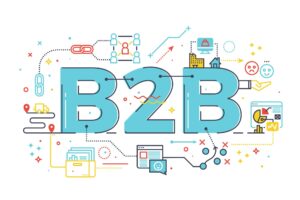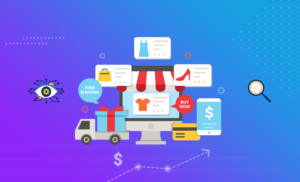Difference Between B2B and B2C Ecommerce

The eCommerce industry can be considered a vast market these days including a large customer base. It is the most adopted sector by businesses to gain profits and maximize revenue.
There are two types of business marketing models including B2B vs B2C used by enterprises when it comes to product manufacturing, marketing & promotion, pricing structure, and other important business practices.
No matter if you are a newbie or an established business owner, you must know about both types of eCommerce models to sell something at a valuable price.
Let’s get to know about them while getting details about B2B vs B2C eCommerce –
What is B2B eCommerce?
B2B refers to a business-to-business working model that let organizations and businesses use online platforms to sell their services or products to other businesses. It also facilitates businesses to maintain relationships and all types of transactions with other businesses, retailers, suppliers, and manufacturers by using an online enterprise platform.
There can be included some complex processes as well as they can handle a large volume of orders. An example of B2B eCommerce can be companies that generate raw materials and sell them to manufacturing firms.
What is B2C eCommerce?
B2C indicates the business-to-consumer model directing to relations between vendors and their customers. In this, sellers focus on selling products and services directly to the customer base with the help of an online retail platform.
This model is helpful to target a small segment of users and brand value is created by advertising and promoting the product. Nowadays, most businesses are opting for B2C eCommerce development services from eCommerce development company as it is more lucrative.
A suitable example of this can be buying any product or booking a hotel or flight online.
Differences Between B2B vs B2C eCommerce Model
It is seen that the B2B eCommerce business model is inclined to be more intricate than the B2C model. A B2B platform uses online platforms to sell its goods and services to other existing businesses, whereas B2C businesses target customers directly. A manufacturing business with a lengthy process can be a good example of a B2B model, on the other hand, the B2C model doesn’t go through a lengthy process as they deal with the customers only.
Various factors represent the difference between B2B vs B2C eCommerce, let’s look at them-
Target Audience:
- B2B Ecommerce: Businesses sell their products or services directly to other businesses. The target audience includes retailers, wholesalers, manufacturers, or any other businesses that require goods or services for their operations.
- B2C Ecommerce: It focuses on selling products or services directly to individual consumers. The end-users are ordinary people who buy products for personal use.
Purchasing Decision:
- B2B Ecommerce: The purchasing decision in B2B transactions is typically more complex and involves multiple stakeholders. Decision-making is based on factors like product specifications, price, quantity discounts, delivery terms, and long-term relationships.
- B2C Ecommerce: In contrast, B2C purchasing decisions are relatively simpler and often driven by emotions, convenience, brand loyalty, and individual preferences.
Volume and Order Size:
- B2B Ecommerce: B2B transactions often involve larger order sizes and higher volume sales than B2C. Businesses usually buy products in bulk to fulfill their operational needs.
- B2C Ecommerce: B2C transactions usually involve smaller order sizes, catering to individual customers’ needs and preferences.
Product Complexity:
- B2B Ecommerce: B2B products or services are often more complex and may require technical specifications, customization, or integration with existing systems.
- B2C Ecommerce: B2C products are generally more straightforward and do not require the same level of customization or technical specifications.
Marketing and Sales Approach:
- B2B Ecommerce: B2B marketing and sales strategies focus on building strong relationships with clients, offering B2B loyalty programs and personalized solutions, and providing excellent customer support.
- B2C Ecommerce: B2C marketing is more consumer-centric, focusing on creating compelling advertisements, promotions, and optimizing user experience to drive individual sales.
Platform Functionality:
- B2B Ecommerce: B2B ecommerce platforms often include features like bulk ordering, customized catalogs, tiered pricing, and integration with procurement systems.
- B2C Ecommerce: B2C platforms focus on providing an easy-to-use and visually appealing interface, with emphasis on product display and a seamless checkout process.
Website Design
Both B2B vs B2C organizations have different requirements when it comes to web designing services because of their customer base. B2B eCommerce includes maximum corporate audiences who prefer responsive and simple-to-use homepages rather than bright and flashy designs. A B2B website also needs to have detailed product information, including convincing B2B video marketing content, images blogs, etc. to help the corporate professionals in the research procedure. Alongside, they also integrate click-to-call buttons and live chat windows to help customers easily find the products and support from the team.
While the B2C retailers choose to design their homepages as vibrant, interactive, and loud to grab attention. They include limited product information such as price, features, and color options. The B2C websites have a preference for fast checkout procedures and self-services.
Pricing Structure
B2B eCommerce organizations have a flexible pricing structure for their customer base as they order in Bulk. On the other hand, B2C organizations include a fixed price for their products and customers can find suitable products as per their budget by using the sort and filter feature comprised at the time of having website development services. B2B organizations only have minimum pricing levels focusing on long-term product sales including the high CLV of their customer base.
For instance, a B2B organization can sell any of the required products to a growing firm at a low price expecting to have more business with them in the future. They also offer other companies customized products comprising microservices. Due to this, their price can also differ according to the customer base.
In B2C eCommerce, they offer less customized and easy products with a fixed price. Thus, there is no price alteration due to any type of product customization. In another form, they offer discounts and specialized deals to frequent customers to increase user interaction and engagement.
Sales Cycle:
- B2B Ecommerce: The B2B sales cycle is typically longer and involves multiple touchpoints, including negotiations, quotes, and approvals. It might take weeks or months to close a deal.
- B2C Ecommerce: B2C sales cycles are generally much shorter, often happening in real-time during the user’s online shopping session.
Payment Terms:
- B2B Ecommerce: B2B transactions often involve more flexible payment terms, such as net 30 or net 60 days, allowing businesses to manage their cash flow efficiently.
- B2C Ecommerce: B2C transactions typically require immediate payment at the time of purchase, and consumers usually use credit cards, digital wallets, or other instant payment methods.
Personalization:
- B2B Ecommerce: Personalization in B2B ecommerce focuses on tailoring product offerings, pricing, and catalogs to specific business needs and customer segments.
- B2C Ecommerce: B2C personalization is centered around individual preferences, shopping history, and behavior to offer relevant product recommendations and promotions.
Customer Support:
- B2B Ecommerce: B2B customer support often involves dedicated account managers or sales representatives who offer personalized assistance and maintain ongoing relationships with clients.
- B2C Ecommerce: B2C customer support typically includes various channels like live chat, email, or phone support to address customer queries promptly.
Branding and Messaging:
- B2B Ecommerce: B2B branding focuses on showcasing expertise, reliability, and building trust in the industry. The messaging often revolves around business solutions and long-term partnerships.
- B2C Ecommerce: B2C branding aims to create emotional connections with consumers, often leveraging storytelling and lifestyle-oriented messaging to resonate with individual buyers.
Shipping and Logistics:
- B2B Ecommerce: B2B shipping and logistics might involve complex fulfillment processes, especially for bulk orders and international shipments, with a focus on efficiency and cost-effectiveness.
- B2C Ecommerce: B2C shipping is more geared towards fast and convenient delivery options, meeting consumer expectations for quick turnaround times.
Returns and Refunds:
- B2B Ecommerce: B2B returns and refunds policies are usually stricter, with emphasis on damaged or faulty products, and often subject to specific terms and conditions.
- B2C Ecommerce: B2C ecommerce tends to have more lenient return policies, allowing consumers to return products within a certain timeframe for various reasons, including change of mind.
Catalog Complexity:
- B2B Ecommerce: B2B catalogs can be extensive and offer a wide range of products with different variants, options, and configurations to meet the diverse needs of businesses.
- B2C Ecommerce: B2C catalogs are typically more straightforward and focused on consumer products with fewer variations to simplify the shopping experience.
Account Management:
- B2B Ecommerce: B2B companies often assign account managers or customer success representatives to specific clients to provide personalized support, understand their needs, and address ongoing requirements.
- B2C Ecommerce: B2C ecommerce platforms typically do not have personalized account management, as interactions are generally transactional and self-service-oriented.
Negotiation:
- B2B Ecommerce: Negotiation is a common aspect of B2B sales, where prices, terms, and conditions may be subject to negotiation between the buying and selling businesses.
- B2C Ecommerce: Negotiation is almost non-existent in B2C transactions, as prices are generally fixed and uniform for all consumers.
Minimum Order Quantities (MOQs):
- B2B Ecommerce: Some B2B sellers may require minimum order quantities to ensure that orders are economically feasible for both parties, especially for products sold in bulk.
- B2C Ecommerce: B2C transactions typically do not have MOQs, as consumers can purchase products in any quantity they desire.
Reordering and Subscription Models:
- B2B Ecommerce: B2B businesses often facilitate reordering and subscription models to cater to their customers’ recurring needs, making it more convenient for businesses to restock essential supplies.
- B2C Ecommerce: While subscription models exist in B2C ecommerce, they are more commonly associated with services (e.g., streaming platforms, meal kits) rather than physical product purchases.
Legal and Regulatory Considerations:
- B2B Ecommerce: B2B transactions may involve more complex legal agreements, contracts, and compliance requirements, especially when dealing with cross-border trade or industries with specific regulations.
- B2C Ecommerce: B2C ecommerce is subject to consumer protection laws and regulations, with a focus on ensuring fair practices, data privacy, and transparency for individual customers.
Customer Reviews and Testimonials:
- B2B Ecommerce: B2B buyers often rely on professional reviews, case studies, and testimonials from other businesses to assess the quality and reliability of products or services.
- B2C Ecommerce: B2C customers frequently refer to user-generated reviews and ratings left by other consumers to make informed purchase decisions.
B2B vs. B2C websites:
| Aspect | B2B eCommerce Website | B2C eCommerce Website |
|---|---|---|
| Target Audience | Sells to other businesses, such as retailers and wholesalers. | Targets individual end-users and consumers. |
| Decision-makers | Engages researchers, managers, sales reps, and brokers who collaborate in purchasing decisions. | Appeals directly to individual end-users who make personal purchase decisions. |
| Purchase Quantity | Facilitates bulk orders and high-volume sales due to business operational needs. | Focuses on small orders and individual sales for personal consumption. |
| Pricing | Offers dynamic and negotiable pricing, with potential discounts as order size increases. | Maintains consistent and fixed pricing for all consumers. |
| Customer Service | Provides comprehensive assistance throughout the stages of the customer journey, building long-term relationships. | Offers after-sales or pre-sales assistance, usually on a one-time basis. |
| Product Complexity | Offers complex and specialized products tailored to business needs and industry requirements. | Focuses on consumer products with simplified features for individual use. |
| Personalization | Provides personalized product recommendations based on business needs and purchasing history. | Utilizes data-driven personalization to recommend products based on individual preferences and behavior. |
| Account Management | Requires business account registration for access to customized pricing and exclusive services. | May offer guest checkout, allowing quick purchases without account creation. Optional account registration is available for personalized experiences. |
| Branding and Messaging | Emphasizes trust, reliability, and industry authority through professional branding and technical content. | Utilizes emotional branding, storytelling, and social proof to connect with consumers on a personal level. |
| Marketing and Branding | Focuses on building enduring partnerships and repeat business, with loyalty programs to reward frequent buyers. | Prioritizes individual transactions and aims to create positive experiences that encourage return visits and referrals. |
| Marketing Channels | Engages in targeted marketing through industry-specific platforms, trade shows, and B2B networking events. | Utilizes social media, influencers, and consumer-focused advertising to reach a broader audience. |
| Order Fulfillment | Manages complex logistics for bulk orders and international shipments, prioritizing efficient B2B distribution. | Focuses on efficient last-mile delivery to individual consumers, often collaborating with third-party logistics providers. |
| Product Display | Prioritizes technical specifications, performance data, and product comparisons to support informed B2B decision-making. | Showcases high-quality images, user-generated content, and product reviews to enhance the B2C shopping experience. |
| Website Navigation | Offers streamlined navigation with clear categorization and easy access to product catalogs and account information. | Emphasizes intuitive navigation, minimal clicks, and seamless checkout to reduce friction in the B2C buying process. |
| Marketing Content | Utilizes whitepapers, eBooks, and industry-specific content to educate B2B buyers and position the brand as an authority. | Creates lifestyle content, user-generated videos, and influencer collaborations to resonate with B2C consumers. |
| Long-term Relationships | Focuses on building enduring partnerships and repeat business, with loyalty programs to reward frequent buyers. | Prioritizes individual transactions and aims to create positive experiences that encourage return visits and referrals. |
The Final Verdict
Above we have described all the major differences between B2B vs B2C eCommerce models. Companies can choose between them considering the requirements of their targeted audience base. Selecting the suitable one will help them in gaining high customer engagement and profits faster.
If you are also planning to launch a B2B or B2C website, you can hire eCommerce developers who will help you to get the one with a smooth storefront.
No matter, if you are going for B2B or B2C model, the only thing you must consider is customers. Though these two also have some similarities but develop the website by keeping in the mind the differences such as design, content, and tech stack.






